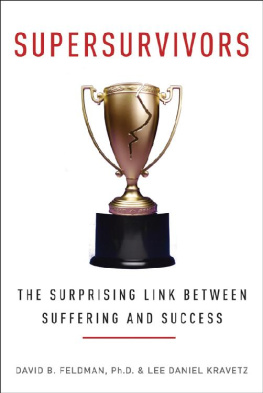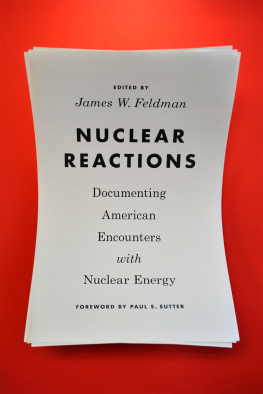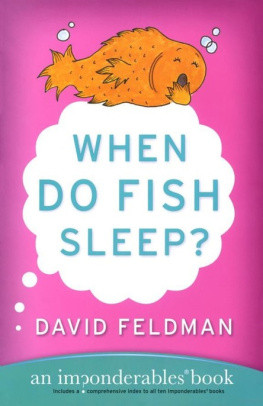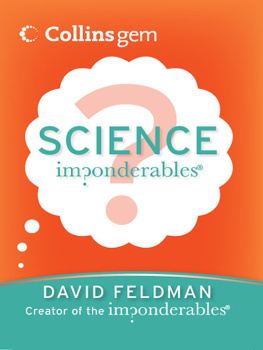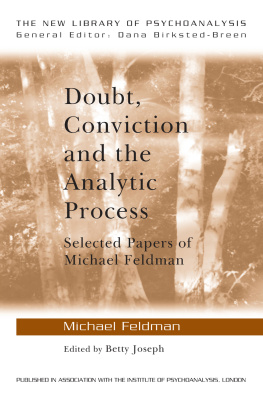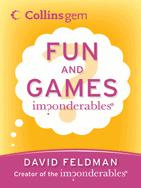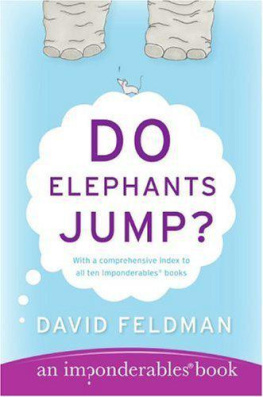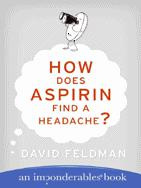David B. Feldman - Supersurvivors
Here you can read online David B. Feldman - Supersurvivors full text of the book (entire story) in english for free. Download pdf and epub, get meaning, cover and reviews about this ebook. year: 2014, publisher: Harper Wave, genre: History. Description of the work, (preface) as well as reviews are available. Best literature library LitArk.com created for fans of good reading and offers a wide selection of genres:
Romance novel
Science fiction
Adventure
Detective
Science
History
Home and family
Prose
Art
Politics
Computer
Non-fiction
Religion
Business
Children
Humor
Choose a favorite category and find really read worthwhile books. Enjoy immersion in the world of imagination, feel the emotions of the characters or learn something new for yourself, make an fascinating discovery.
- Book:Supersurvivors
- Author:
- Publisher:Harper Wave
- Genre:
- Year:2014
- Rating:4 / 5
- Favourites:Add to favourites
- Your mark:
- 80
- 1
- 2
- 3
- 4
- 5
Supersurvivors: summary, description and annotation
We offer to read an annotation, description, summary or preface (depends on what the author of the book "Supersurvivors" wrote himself). If you haven't found the necessary information about the book — write in the comments, we will try to find it.
Supersurvivors — read online for free the complete book (whole text) full work
Below is the text of the book, divided by pages. System saving the place of the last page read, allows you to conveniently read the book "Supersurvivors" online for free, without having to search again every time where you left off. Put a bookmark, and you can go to the page where you finished reading at any time.
Font size:
Interval:
Bookmark:

For my parents, who taught me how to hope.
DAVID B. FELDMAN
For Mimi. You were right.
LEE DANIEL KRAVETZ
Contents
To destroy is always the first step in any creation.
E. E. CUMMINGS, SUPERSURVIVOR
O n the spectrum of trauma survivorship, everyone falls somewhere between hiding under a rock and becoming a rock star.
Asha Mevlana lay on a table in a small examination room at Saint Vincent Catholic Medical Center in the West Village, New York City, when this first crossed her mind. She was twenty-four years old, dark-haired, and beautiful. The technology industry in 2002 was making young people all over the city rich. She had a great job at a start-up, an apartment in SoHo, and a pearl-shaped problem within her left breast.
Asha had already guessed that it was cancer; the lab technicians grim look was merely confirmation. The defining moment of her ordeal, however, wasnt the diagnosis. It wasnt the biopsy at Sloan Kettering. It also wasnt the undeniable sensation that her life was spinning out of control as she underwent eight months of chemotherapy. It wasnt her baldness or her candle-wax pallor, either.
For Asha, the defining moment came after the doctors announced that she was cancer-free and sent her back out into the world. She noticed that something within her had changed. While shed been facing her mortality, everyone else had gone on blithely living their lives. Her coworkers talked about the crummy New York weather, the long lines at Starbucks, and the finalists on American Idol . The blissfully mundane events of their lives seemed to diminish the most significant and defining experience of hers. Everyone seemed to place value in such inconsequential things, and she found herself yearning for a time when she did as well.
Life as Asha once knew it simply didnt make sense anymore; it seemed empty. So, she promptly dropped out of it. Im not a religious person, but I prayed: Just give me a second chance and Im going to change my life. Im going to do what Im passionate about, she says.
A sha is not alone.
According to the American Cancer Society, roughly thirteen million people around the world are diagnosed with cancer each year, a number that is projected to double in the next two decades. The journal Neuroimaging Clinics of North America provides a similarly grim outlook, with a startling ten million people worldwide affected every year by traumatic brain injuries. The harsh reality of widespread trauma becomes even more apparent once we combine these numbers with the World Health Organizations calculation that fifty million people a year survive car wrecks; the United Nations finding that one out of every three women will be beaten, raped, or otherwise abused during her lifetime; and the realization that these statistics cover only a small portion of the catastrophes that befall people every day.
It is no coincidence that the seeds of this book took root during a particular point in history, one that could be fairly characterized as traumatic for a lot of people. Americas housing bubble ruptured, global markets plummeted, millions of people lost jobs and homes, the Tohoku earthquake shifted the earth on its axis by more than six inches, and as acts of terrorism spiked, people found themselves grasping for a sense of safety. These days, such events are practically the backdrop of daily life.
Harvard Medical School professor of psychiatry Judith Herman calls trauma the affliction of the powerless. The problem is were all powerless against the vicissitudes of fate. At the moment of trauma, the victim is rendered helpless by an overwhelming force. When the force is that of nature, we speak of disasters. When the force is that of other human beings, we speak of atrocities, she writes in her book Trauma and Recovery . Traumatic events are extraordinary, not because they occur rarely, but rather because they overwhelm the ordinary human adaptations to life. Depending on the particular type of trauma, about a quarter of survivors will fall into posttraumatic stress disorder, a painful and often debilitating condition. Others will experience significant depression or anxiety.
In the midst of all this adversity, its tempting to become pessimistic and fall into a kind of fatalistic hopelessness. Its easy to overlook the amazing potential for resilience in us as human beings. Amazingly, even in midst of trauma, people continue to smile, to love, to celebrate, to create, and to renew. In making this observation, we absolutely do not mean to belittle the impact of traumatic times or the suffering many have endured and continue to endure. Suffering is real, but resilience is also real. It is an incredible and encouraging fact about human nature that, contrary to popular belief, after a period of emotional turmoil, most trauma survivors eventually recover and return to their lives. They bounce back.
And in some cases, they do much more. They bounce forward , and in truly remarkable ways. A significant minority, as a result of the trauma, feel called upon to engage in a wider world, Herman writes. They refocus their energies on a new calling, on a new mission, on a new path, on helping others who have been victimized, on education, on legal reforms, or any number of other big goals. They move beyond mere resilience. They transform the meaning of their personal tragedies by making them the bases for change.
We call these people supersurvivors.
I n the aftermath of her cancer diagnosis, Asha paid for improvisational violin lessons. Her teacher took a unique approach with her. She asked me to play how I felt the day I walked into the hospital to get treatments, she explains. She didnt want me to use any words, just my instrument. It was the first time I felt close to my instrument and was actually able to improvise from my heart. Looking back, I was actually meditating on my instrument. I played the anxiety I felt when they injected the needle into my arm that contained the chemo. I played about trying to be strong for everyone else, even though I was terrified. I learned how to express myself through my instrument.
Before surviving her trauma, Asha had no illusions about making a career out of music. You mean like playing for bar tips? No, it never crossed my mind. I was just way too practical, she remembers. But that pragmatism didnt survive the chemotherapy. After working hard for many months, she began playing electric violin for a few amateur rock bands. This was a new and invigorating experience for her; she hadnt hung out with people like this before. All her friends were either investment bankers or corporate suits. Something about this new life clicked. Perhaps it was the unscripted nature that, much like the music itself, was creative and freeing. A couple of months later, when a friend invited her to visit Los Angeles for a weekend, she met a number of local musicians who convinced her she could get paying gigs in California.
Before her cancer Asha believed, like many, that mature adults should settle into a routine life and count their blessings. I wouldnt have ever told anyone I really wanted to be a rock violinist, she says. Nobody even knew what that was, but it was always in the back of my head. Id never taken any risks before. Everything Id ever done had been very calculated. I stuck to things I knew Id be successful at.
It would be an enormous risk. Ashas entire universe was on the East Coast. She had no job prospects in Los Angeles, no income, no place to live, and a million reasons to go back to her old life. Plus, although proficient in violin, she was safely an amateur.
Then again, she was twenty-eight years old, one of the youngest survivors of breast cancer she knew, spiritually damaged, and more than a little lost. From this perspective, she had nothing to lose.
Font size:
Interval:
Bookmark:
Similar books «Supersurvivors»
Look at similar books to Supersurvivors. We have selected literature similar in name and meaning in the hope of providing readers with more options to find new, interesting, not yet read works.
Discussion, reviews of the book Supersurvivors and just readers' own opinions. Leave your comments, write what you think about the work, its meaning or the main characters. Specify what exactly you liked and what you didn't like, and why you think so.

